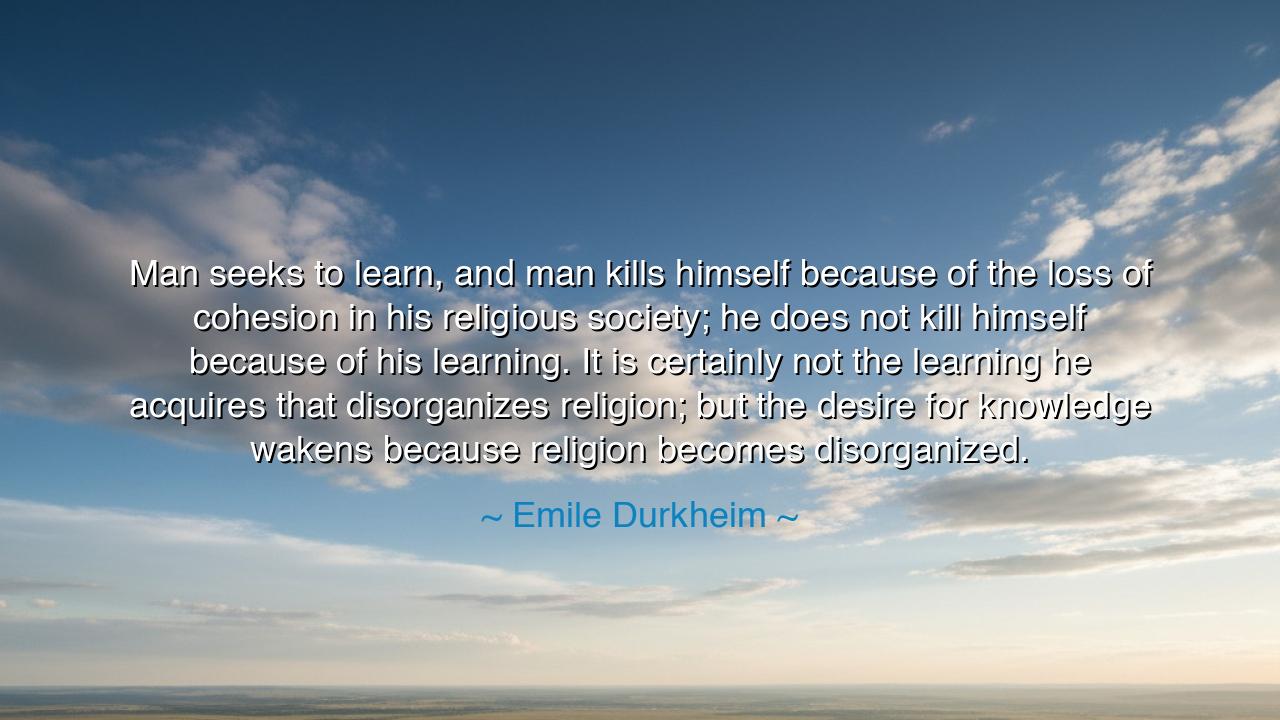
Man seeks to learn, and man kills himself because of the loss of
Man seeks to learn, and man kills himself because of the loss of cohesion in his religious society; he does not kill himself because of his learning. It is certainly not the learning he acquires that disorganizes religion; but the desire for knowledge wakens because religion becomes disorganized.






“Man seeks to learn, and man kills himself because of the loss of cohesion in his religious society; he does not kill himself because of his learning. It is certainly not the learning he acquires that disorganizes religion; but the desire for knowledge wakens because religion becomes disorganized.” — Émile Durkheim
In this profound and sorrowful meditation, Émile Durkheim, the father of modern sociology, unveils a truth that pierces through the ages — that the crisis of mankind does not arise from knowledge, but from the loss of spiritual unity. He speaks not as a theologian, but as an observer of the human soul and society, seeing how, when the bonds of faith and community weaken, man turns restlessly toward knowledge, seeking in the intellect what he has lost in the heart. Yet this quest, noble though it may be, cannot by itself fill the void of meaning. The tragedy of modern man, Durkheim tells us, is not that he knows too much, but that he belongs too little. His suffering does not come from his learning, but from the crumbling of the cohesion that once bound him to the sacred and to his fellow beings.
To understand these words, one must know the time and soul of Durkheim. He lived in the late nineteenth century, an age trembling between faith and reason. The Industrial Revolution had transformed societies, science was ascendant, and religion’s authority was waning. The old order that had once given man purpose — the rituals, the shared beliefs, the moral community — began to dissolve beneath the weight of modernity. In his great work, Suicide, Durkheim examined the spiritual emptiness of his age. He discovered that when individuals lose their sense of belonging and shared moral direction, their lives become untethered. Thus, he wrote that it is not knowledge that kills man, but the disintegration of the sacred fabric that once gave knowledge meaning and life coherence.
What, then, does Durkheim mean when he says that “the desire for knowledge wakens because religion becomes disorganized”? It is a striking reversal of what many would assume. He suggests that when religion weakens — when man no longer finds unity, awe, or moral strength in the divine — his spirit turns toward reason as a new source of order. Yet this desire for knowledge, though it may enlighten the mind, cannot by itself sustain the soul. Knowledge thrives when it is framed by meaning; when that meaning dissolves, the pursuit of truth becomes a lonely pilgrimage. Thus, the flame of inquiry is often born not from harmony, but from disorder, from the aching need to rebuild what was lost.
We may see this pattern throughout history. In the twilight of ancient Greece, when the old gods began to fade from the hearts of men, the philosophers arose — Socrates, Plato, Aristotle — searching for new foundations of truth. Their wisdom shone brightly, yet their age was marked by confusion and spiritual exhaustion. Later, in Europe’s Enlightenment, when religious unity fractured under the blows of reform and reason, mankind once again sought salvation in knowledge. Science and philosophy rose like twin suns, but they could not fully replace the warmth of shared faith. In both ages, man’s pursuit of wisdom burned brightest in the ruins of his sacred temples.
Durkheim does not condemn this hunger for knowledge — indeed, he honors it as part of humanity’s divine restlessness. But he warns that without moral cohesion, learning may become sterile, cold, even despairing. A society that exalts intellect while neglecting belonging breeds loneliness and isolation. The scholar may know the laws of the stars but forget the laws of the heart. The citizen may master the tools of science but lose the meaning of life. Thus, Durkheim’s insight is not an attack on progress, but a plea for balance: that man must never let wisdom of the mind outpace the wisdom of the soul.
Consider, in our own time, how this truth repeats itself. In an age of technology and instant information, we know more than any generation before us — yet we suffer greater anxiety, alienation, and despair. The temples of old have been replaced by glowing screens, and though they reveal vast knowledge, they offer little cohesion. The modern mind is illuminated but often directionless, curious yet hollow. Durkheim foresaw this: that knowledge without connection, progress without purpose, would leave mankind brilliant but broken, knowing all things and understanding none.
Therefore, dear listener, let this wisdom be engraved in your heart: knowledge is not the enemy of the spirit, but it must be wedded to meaning. Seek to learn, yes — but do not forget to belong. Build not only the mind, but the bonds that hold men together in trust, reverence, and compassion. The soul needs both truth and tenderness, both reason and ritual. If faith falters, let knowledge guide you toward unity, not arrogance. Let your learning restore what was lost — the harmony between man, his brothers, and the sacred mystery of existence.
For Durkheim’s words are not merely a diagnosis of a dying age; they are a call to rebirth. They remind us that man’s salvation lies not in rejecting knowledge, but in reconciling it with love, with community, with the sacred. For only when wisdom walks hand in hand with reverence does humanity find its true strength — and transform its restless hunger for learning into the radiant light of understanding.






AAdministratorAdministrator
Welcome, honored guests. Please leave a comment, we will respond soon